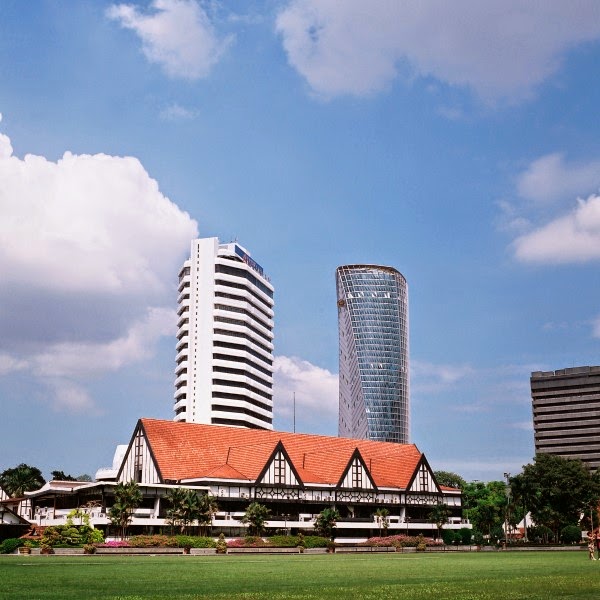Images from the City Centre (II)
1. Golden.
2. Big brother.
3. Architecture.
4. Bridge.
5.
6.
Question: which camera would you choose if you want something portable, easy to shoot with, medium format quality, and with a lens that is slightly wider than normal?
Answer: Fuji GS645S. Medium format rangefinder with 60mm lens, fully mechanical with coupled meter. Ticks every box.
The Fuji GS645S, released in 1984, is a follow-up of the Fuji GS645 (without "S") released a year earlier. This GS645S can be identified by its distinctive crash bar around the lens, likely due to its inherent design weakness as it is based on the folder design (read: fragile) of the GS645. It sports an excellent 7-element Fujinon 60mm lens, which in 35mm format is equivalent to about 38mm. Shooting a rangefinder is much easier than an SLR in medium format world due to SLR's large flippin' mirror causing significant vibration. Rangefinder design allows handheld shooting at slow shutter speeds which is impossible for medium format SLRs. Also, with the coupled light meter, shooting with this camera is easy as there is no need for eye metering or carrying a light meter. In terms of portability, SLRs in 645 format are all modular systems (like my Bronica ETRS, Mamiya 645 series etc), thus making them very bulky. For 645 format rangefinders, there is the Fuji's and an alternative would be the excellent Bronica RF645 system, however that costs quite a bit more compared to the Fuji's.
Now, nothing is perfect, and this is especially true for Fuji rangefinders from the 80's. The most important thing is they are notorious for being fragile cameras and requires some babying and care. The materials used just do not give confidence, and the design is based on the GS645's folder design, which meant that there wasn't a rigid, solid structure to mount the lens where the GS645's lens used to be- thus requiring protective crash bars around the lens. A quick play with it will tell you the weak point of the camera, and by all means, avoid hitting the camera against anything because it feels like it will just fall apart. Another way to destroy the camera is to catch something with the semicircular crash bar around the lens- that will probably rip the camera apart like committing seppuku (切腹).
All being said, the Fuji GS645S is a wonderful camera, with a beautiful, well-designed 7-element 60mm lens (Fujinon lenses have quite a reputation) in a fully mechanical body, complete with an easy to use coupled meter. The rangefinder design allows better portability and a wider shooting envelope, which enhances its appeal. Definitely look forward to shoot more with this camera!
LY.
2. Big brother.
3. Architecture.
4. Bridge.
5.
6.
Question: which camera would you choose if you want something portable, easy to shoot with, medium format quality, and with a lens that is slightly wider than normal?
Answer: Fuji GS645S. Medium format rangefinder with 60mm lens, fully mechanical with coupled meter. Ticks every box.
The Fuji GS645S, released in 1984, is a follow-up of the Fuji GS645 (without "S") released a year earlier. This GS645S can be identified by its distinctive crash bar around the lens, likely due to its inherent design weakness as it is based on the folder design (read: fragile) of the GS645. It sports an excellent 7-element Fujinon 60mm lens, which in 35mm format is equivalent to about 38mm. Shooting a rangefinder is much easier than an SLR in medium format world due to SLR's large flippin' mirror causing significant vibration. Rangefinder design allows handheld shooting at slow shutter speeds which is impossible for medium format SLRs. Also, with the coupled light meter, shooting with this camera is easy as there is no need for eye metering or carrying a light meter. In terms of portability, SLRs in 645 format are all modular systems (like my Bronica ETRS, Mamiya 645 series etc), thus making them very bulky. For 645 format rangefinders, there is the Fuji's and an alternative would be the excellent Bronica RF645 system, however that costs quite a bit more compared to the Fuji's.
Now, nothing is perfect, and this is especially true for Fuji rangefinders from the 80's. The most important thing is they are notorious for being fragile cameras and requires some babying and care. The materials used just do not give confidence, and the design is based on the GS645's folder design, which meant that there wasn't a rigid, solid structure to mount the lens where the GS645's lens used to be- thus requiring protective crash bars around the lens. A quick play with it will tell you the weak point of the camera, and by all means, avoid hitting the camera against anything because it feels like it will just fall apart. Another way to destroy the camera is to catch something with the semicircular crash bar around the lens- that will probably rip the camera apart like committing seppuku (切腹).
All being said, the Fuji GS645S is a wonderful camera, with a beautiful, well-designed 7-element 60mm lens (Fujinon lenses have quite a reputation) in a fully mechanical body, complete with an easy to use coupled meter. The rangefinder design allows better portability and a wider shooting envelope, which enhances its appeal. Definitely look forward to shoot more with this camera!
LY.
Subscribe to:
Comments (Atom)
.jpg)
.jpg)
%2B(Custom).jpg)
%2B(Custom).jpg)
.jpg)
.jpg)
.jpg)
.jpg)
.jpg)
%2B(Custom).jpg)





